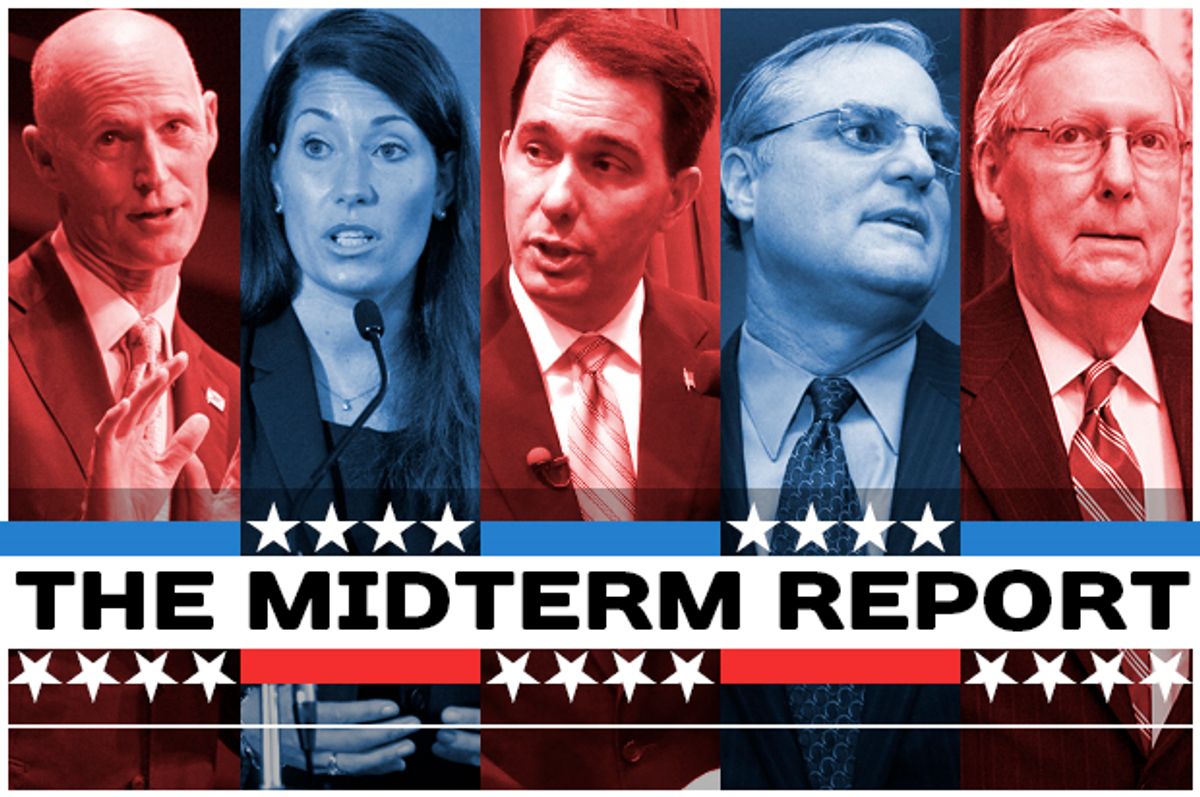Could the minimum wage prove decisive in some of 2014’s most fiercely contested races? New polling data from six states featuring closely fought gubernatorial and Senate races suggests that it might.
The surveys, conducted by Public Policy Polling, gauged likely voters’ support for raising the minimum wage to $10.10 an hour; the current federal minimum is $7.25 an hour. PPP polled voters in Illinois, North Carolina, Kentucky, Louisiana, Iowa, and Wisconsin. Majorities in each state backed a wage boost, by margins ranging from 14 to 28 points. Moreover, pluralities in each state said they’d be less likely to support candidates who oppose raising the minimum wage – which could help tip some of the closest races.
Likely voters in Illinois were most supportive of a wage increase, favoring a raise by 61 to 33 percent. Forty seven percent of voters said they’d be less likely to back a candidate opposing a wage increase, against just 17 percent who’d be more likely to support such a candidate. The numbers are welcome news for Democratic Gov. Pat Quinn’s campaign. Once trailing Republican Bruce Rauner in the polls, Quinn has bounced back to a lead over the billionaire investor. Rauner opposes a wage increase and had even supported decreasing Illinois’ minimum wage by $1 per hour until that position became politically untenable.
In neighboring Iowa, voters support a wage increase by a 15 point margin, 53 to 38 percent. Forty seven percent of Iowans are less likely to support an opponent of a wage increase, while 24 percent are more likely to support such a candidate. Republican Senate nominee Joni Ernst opposes increasing the minimum wage, contending that $7.25 an hour is a “great starter wage” for high schoolers, even though just 24 percent of minimum wage earners are between the ages of 16 and 19. Recent polls show that the contest between Ernst and Democrat Bruce Braley is a dead heat.
The minimum wage issue also has the potential to shake up yet another Midwestern battleground. Earlier this week, Wisconsin Gov. Scott Walker asserted that the minimum wage “doesn’t serve a purpose,” and his administration claimed earlier this month that $7.25 an hour is a “living wage.” PPP’s survey finds that 74 percent of Wisconsin voters reject that notion, saying that they couldn’t support their families on a minimum wage income. The state’s voters support an increase by a 14 point margin, 53 to 39 percent, and 44 percent say they’re less likely to vote for an opponent of a wage increase. Only 25 percent would be more likely to support a candidate who holds Walker’s position. The race between Walker and Democrat Mary Burke is a statistical tie; RealClearPolitics’ polling average gives the incumbent a 0.4 point lead.
Meanwhile, popular support for a wage increase could shore up Democratic Sen. Kay Hagan of North Carolina, who has held a small lead over Republican Thom Tillis in most recent polls. It could also boost the chances of Democratic Louisiana Sen. Mary Landrieu, among the Senate’s most endangered incumbents, and Alison Lundergan Grimes, the Kentucky Democrat taking on Senate Minority Leader Mitch McConnell. Grimes has trailed McConnell in most polls, but a recent Bluegrass poll showed her with a two point edge, indicating that the contest could still be up for grabs.
In other midterms news:
- Last night’s Florida gubernatorial debate witnessed one of the most bizarre spectacles in the history of American political debates. Republican Gov. Rick Scott, who’s facing a challenge from former Gov. Charlie Crist, refused for several minutes to appear on stage when the debate was scheduled to begin. The reason? Crist had a fan under his lectern. Scott protested that fans had been banned in the debate’s agreed-upon rules. After some awkward chatter among the moderators and jeers from the audience, Scott eventually emerged and the debate began. ThinkProgress has video. According to the Huffington Post, this isn't the first time Crist has irked a debate opponent with the presence of a fan; a similar dispute also erupted at a 2006 gubernatorial primary debate.
- The Democratic Senatorial Campaign Committee may have announced this week that it was withdrawing from television advertising in the Kentucky Senate race, but that doesn’t mean that the DSCC has given up on Alison Lundergran Grimes yet. Politico reports that the DSCC is still polling the state, and DSCC chair Sen. Michael Bennet is leaving the door open to resuming TV advertising. In playing down the significance of the DSCC’s decision earlier this week, Grimes backers have cited her fundraising prowess and the involvement of outside groups in the state as reasons that Kentucky is still in play.
- The New York Times’ Upshot vertical gives Republicans a 74 percent chance of taking back the Senate this year. That means Majority Leader Mitch McConnell is all but a done deal, right? Not so fast – in a useful explainer on forecasting models’ predictions, the Upshot’s David Leonhardt cautions readers “not to be fooled by odds.” Here’s one way of thinking about Senate forecasts and probabilities: “If I tell you that the odds of rolling an eight or lower with two dice are about 74 percent — 72.2 percent to be precise — you get it,” Leonhardt writes. “You don’t think that I’m predicting you will roll an eight or lower. You won’t call me wrong if you roll an 11. You understand that I am saying you will roll nine or higher less than 50 percent of the time but more than never.”

Shares